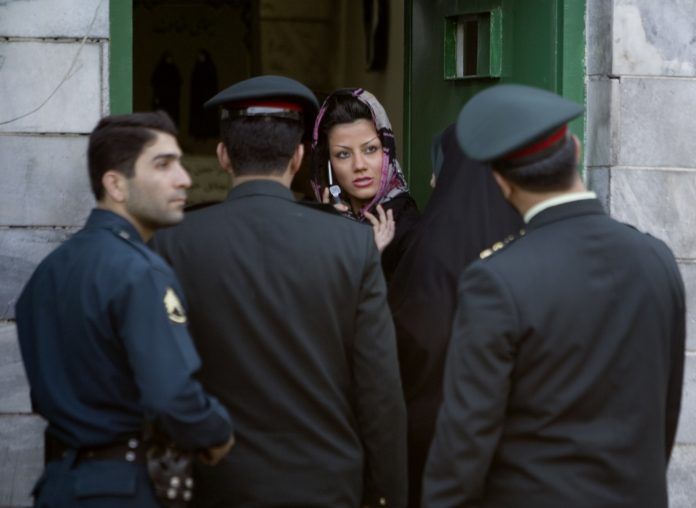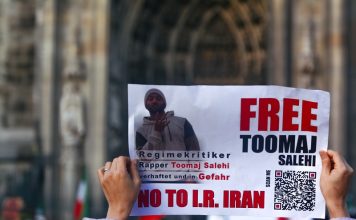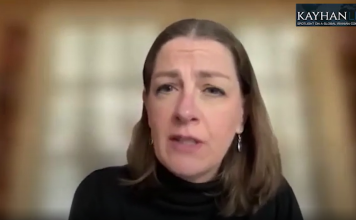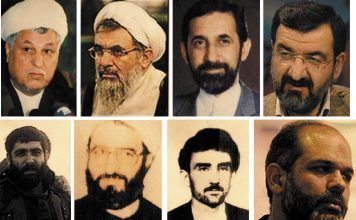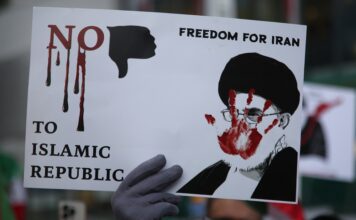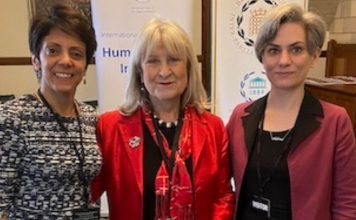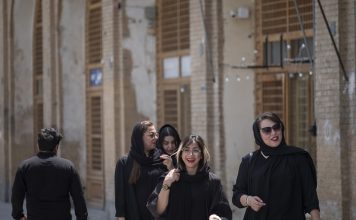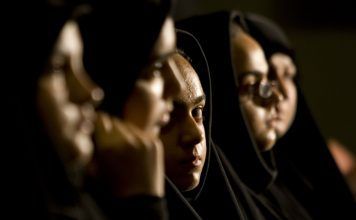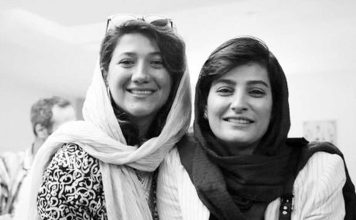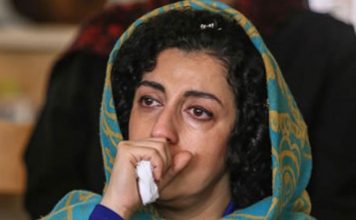By Kayhan Life Staff
Iranian President Ebrahim Raisi has ordered the Supreme Council of the Cultural Revolution to enforce the “Hijab and Chastity Law,” the Tehran-based Entekhab newspaper reported on July 6.
“Regarding hijab and chastity, we urge the Supreme Council of the Cultural Revolution and other institutions to enforce the law passed by the Majlis, and the law passed by the Supreme Council of the Cultural Revolution in 2005,” Entekhab quoted President Raisi saying.
Mr. Raisi accused the “enemies of Iran and Islam” of using global TV channels and social media to “spread corruption and target cultural, religious principles.”
[aesop_image img=”https://kayhanlife.com/wp-content/uploads/2022/01/ebrahim-raeesi-edam.jpg” panorama=”off” credit=”Illustration by KL./” align=”center” lightbox=”on” captionsrc=”custom” captionposition=”left” revealfx=”off” overlay_revealfx=”off”]
“We must remain resolute and fend off these coordinated and widespread onslaughts by the leaders of the world hegemony and enemies of the Iranian nation,” Raisi warned. “All relevant institutions must make concerted efforts to counter these actions.”
It is noteworthy that the Supreme Council of the Cultural Revolution, which adopted the “Hijab and Chastity” measure in 2005, is not a legislative body and cannot pass any laws.
The Majlis (Iranian Parliament) debates and passes government bills which the Guardian Council must subsequently ratify before they become law.
However, “Hijab and Chastity” is only a scheme, not a law, given that the Majlis has yet to debate and pass the proposal.
Since coming into office nearly a year ago, President Raisi and his hardline government have set out to restrict women’s civil rights and freedoms.
In comments reported by the Islamic Republic News Agency (IRNA) on June 30, Seyyed Ali Khan-Mohammadi, the director of the “Enjoying What Is Right and Forbidding What Is Evil HQ,” announced the creation of the “Guidance Patrol for Managers and Executives” to monitor and enforce mandatory hijab in all government offices.
“The Guidance Patrol for Managers and Executives has started its operation in government offices to deal decisively with workplace transgressions including hijab violations,” IRNA quoted Mr. Khan-Mohammadi saying. “We agree with the ‘Protection Scheme’ completely.”
In July 2021, the Majlis passed a draft bill on “Protecting Rights of Internet Users and Regulating Social Media Messaging Apps,” commonly known as the “Protection Scheme.” The Majlis has not passed the bill yet.
Under the “Protection Scheme,” Iranian authorities would be able to filter almost all popular messaging platforms that haven’t filed for a license and appointed a representative within four months of its ratification. If the bill becomes law, violators would be prosecuted under the Islamic Republic penal code 7, which entails fines and imprisonment.
Iran Bans Screening Tests for Pregnant Women Under 35 With No Prior Abnormalities
“We have proposed a comprehensive plan to address the current hijab problem in society. We disapprove of the current situation,” Mr. Khan-Mohammadi added. “Under the Constitution, everyone must uphold the principle of ‘enjoying what is right and forbidding what is evil,’ and we aim to strengthen people’s participation in this area.”
Two weeks earlier, the “Enjoying What Is Right and Forbidding What Is Evil HQ” in the southwestern province of Khuzestan announced the creation of “21 Tir Base” (July 12 Base) to “enforce mandatory hijab in government offices.”
“The ‘Enjoying What Is Right and Forbidding What Is Evil HQ’ enforces ‘Hijab and Chastity Law’ in 32 government institutions,” IRNA reported, quoting Bahman Shahriyari, the secretary of Khuzestan’s Enjoying What Is Right and Forbidding What Is Evil HQ.
The Islamic Republic has designated July 12 as “Hijab and Chastity Day.”
The Hijab and Chastity scheme has further empowered the Guiding Patrol (Morality Police) to harass and intimidate girls and women.
President Raisi and his ultraconservative government are reverting to heavy-handed tactics used by the “Revolutionary Committees” and Islamic fundamentalists in 1980 to enforce a restrictive dress code, punishing hijab violators and men who wear short-sleeve t-shirts or shirts.
In the past year, the government has ordered the Morality Police to enforce mandatory hijab aggressively, promoted child marriages, banned female spectators from football matches, and withheld all legal, psychological, and financial support from domestic abuse and rape victims.
Many senior state officials have joined the renewed effort to enforce mandatory hijab in government offices and public places.
The Governor of the Islamic Republic of Iran Central Bank, Ali Salehabadi, recently praised the new directive by the “Enjoying What Is Right and Forbidding What Is Evil HQ” on enforcing the “Hijab and Chastity” scheme, saying his office understood the grave responsibility of implementing the measure.
In comments reported by the Tehran-based Donya-e-Eghtesad newspaper on July 6, Mr. Salehabadi said: “We in the Central Bank and banking sector take our responsibility to address this issue seriously.”
“The directive by the ‘Enjoying What Is Right and Forbidding What Is Evil HQ’ to the Central Bank has been shared with other banks,” Salehabadi explained. “However, this is only the beginning of the process, which will continue with utmost seriousness.”
Bank Mellat recently issued a directive banning female employees from wearing sheer tights and stockings, high-heel shoes, and footwear that makes a “loud noise.” It also barred bank managers from hiring female secretaries.
Saleh Rahimi, the Governor of Bushehr, capital of the southern province of Bushehr, recently said: “Male and female employees in government offices must work in separate rooms. Our female colleagues must wear a chador [full-length veil] when attending meetings at the City Hall. Any manager failing to enforce the rule will be reprimanded.”
The “21 Tir Base” in Mashhad has gone even further in enforcing the “Hijab and Chastity” scheme, banning men from wearing “Western clothes,” including ties, bow ties, t-shirts, slim-fit shirts, see-through shirts, trousers with zippers, and gold jewelry and accessories.
Mehdi Rezaei, the director of “Enjoying What Is Right and Forbidding What Is Evil HQ” in the northeastern province of Khorasan Razavi, recently said that the “plainclothes guidance patrol” were monitoring government offices, pharmacies, banks, organizations, and public service buildings, adding that the HQ had enough inspectors to carry out the work.
In a letter dated June 26, the deputy prosecutor of the holy city of Mashhad, the capital of Khorasan Razavi Province, urged the police department to ban women who do not adhere to strict hijab from using the metro.
While the letter sparked public outcry, it received support from senior state officials.
Iran’s Attorney General, Mohammad Jafar Montazeri, said the letter was “within the legal framework” but added that officials “must be prudent when deciding this issue.”
In comments reported by the Tehran-based Eghtesad News website on July 6, the hardline Friday prayer leader of Mashhad, Seyyed Ahmad Alamolhoda, said: “Greedy profiteers and investors open leisure centers and make money from the visiting pilgrims. Soon Mashhad will change from being Imam Reza’s city to a leisure center. The city will lose its Razavi [revered] identity.”
“Mashhad is the primary target of the enemy’s cultural conspiracies,” Mr. Montazeri, President Ebrahim Raisi’s father-in-law, warned. “If the enemy successfully destroys religious values and beliefs in this city, it can easily do the same in other cities. That is why the enemy is trying to promote widespread moral corruption in Mashhad and destroy the spiritual climate here.”
“The enemy’s main goal is to dissuade us from following our revolutionary activities,” Montazeri argued. “We do not have any reason to fear character assassinations carried out by some media outlets and enemy agents if we promote strong religious beliefs.”
“When Ayatollah [Mahmoud] Taleghani [1911-1979] heard about the brutal enforcement of a strict hijab dress code, he said, in no uncertain terms, that the hijab should not be mandatory,” the Tehran-based Etemad newspaper said on July 6. “However, after the Revolution, some people used violent tactics to enforce mandatory hijab.”
“As a result, the true meaning of hijab is lost on several generations of young Iranians,” the paper added. “Even some who wear the hijab have joined those who oppose the mandatory hijab.”

